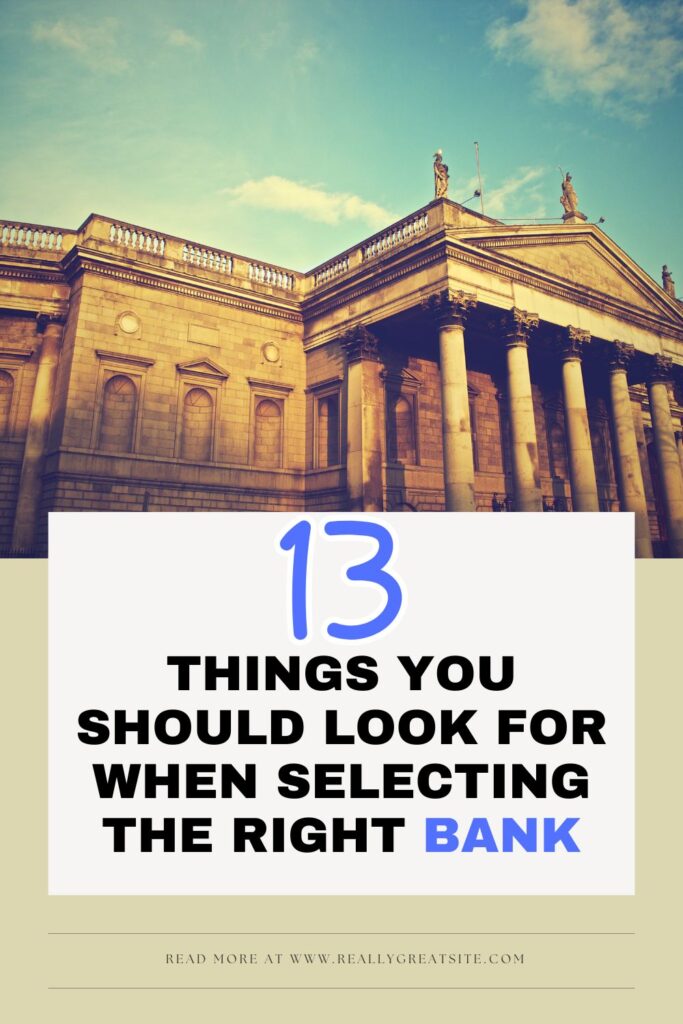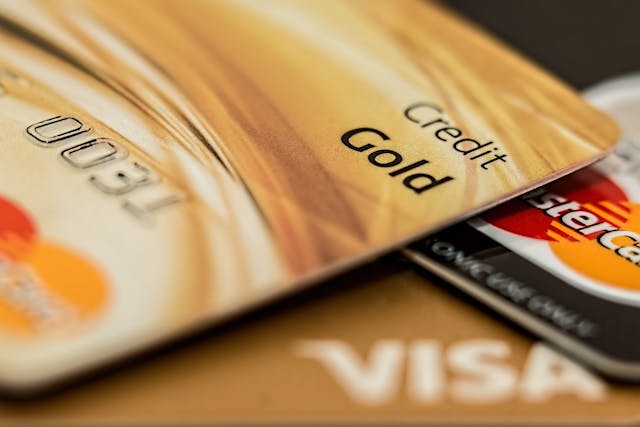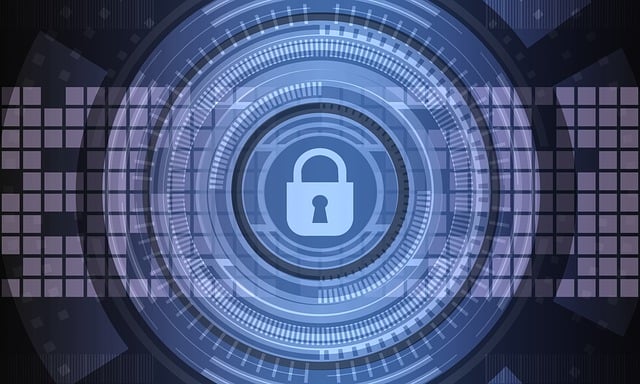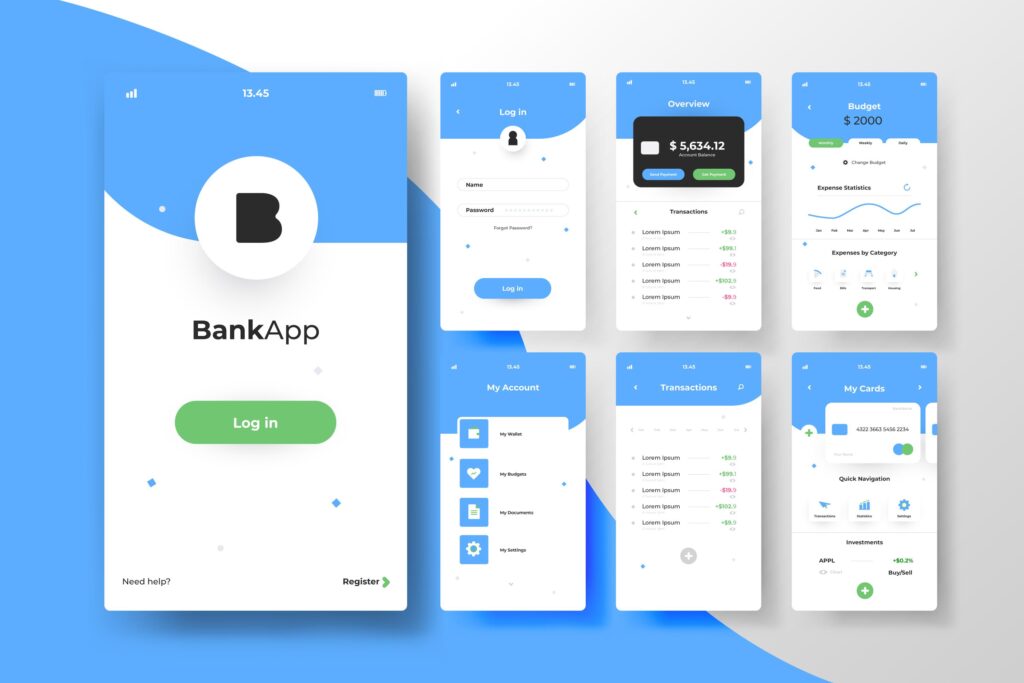What are some of the things you should look for when selecting the right bank? Let’s look at the important aspects that you should consider when choosing the best bank for your needs. Choosing the right bank is an important financial decision that can affect your daily life, savings goals, and overall economic health. The right bank can provide convenience, help you save money, and even offer benefits you may not be aware of. Let’s look at the important aspects that you should consider when choosing the best bank for your needs.

1. Types of Banks
The first step in choosing a bank is to understand the different types available. Not all banks are created equal, and knowing the differences can help you find a bank that matches your lifestyle and goals. What are some of the things you should look for when selecting the right bank? Consider factors like fees, account offerings, interest rates, convenience of locations, online banking services, and customer support. Evaluating these aspects will ensure that the bank you choose aligns with your financial needs and preferences.
Commercial Banks
Commercial banks are traditional, large financial institutions where most people deposit their money. They offer a variety of services such as checking and savings accounts, loans, credit cards, and investment opportunities. These banks often have a large network of ATMs and branches, but their fees may be higher than smaller institutions.
Credit Unions
Credit unions are non-profit organizations that are owned by their members. They offer lower fees and higher interest rates on savings accounts. The downside is that they may have fewer branches or ATMs, and you often have to meet certain criteria to become a member.
Online-Only Banks
Online banks have no physical branches, which allows them to offer lower fees and higher interest rates. They usually provide excellent online and mobile banking services but may lack personal customer support. If you’re comfortable doing all of your banking online, this may be the most cost-effective option.

2. Bank Fees
One of the most important factors to consider is the fee structure. Banks make money by charging fees for various services, so it’s important to understand these fees.
Monthly Maintenance Fees
Some banks charge a monthly maintenance fee just for holding the account, while others waive the fee if you meet certain criteria such as maintaining a minimum balance.
ATM Fees
If you frequently use ATMs outside your bank’s network, you may pay additional fees. Look for a bank that either has a large network of fee-free ATMs or offers ATM payments.
Overdraft Fees
An overdraft fee occurs when you spend more than you have in your account. These fees can add up quickly, so it’s important to understand the bank’s overdraft policies. Some banks offer overdraft protection, which can help you avoid hefty fees.
Wire Transfer Fees
If you frequently send money internationally or domestically via wire transfer, check what fees the bank charges for these transactions. Some banks offer free or discounted wire transfers for premium accounts.
3. Interest Rates on Savings
Interest rate is an important factor if you want to increase your savings. Banks offer different savings options, and interest rates can vary greatly. What are some of the things you should look for when selecting the right bank? It’s crucial to consider factors like fees, accessibility, customer service, and additional financial services offered, as these can significantly impact your overall banking experience.
Savings Accounts
Find a bank that offers competitive interest rates on savings accounts. While many traditional banks offer low rates, online banks often offer higher yields.
Certificates of Deposit (CDs)
CDs typically offer higher interest rates than regular savings accounts in exchange for locking up your money for a certain period. Check the bank’s CD rates and terms to see if they fit your savings goals.
Money Market Accounts
Money market accounts typically offer higher interest rates than standard savings accounts, but they often come with higher minimum balance requirements. These accounts can be a good choice if you are looking for a combination of checking and savings features.
4. Loan and Credit Offerings
If you anticipate needing a loan or credit in the future, it is wise to choose a bank that offers favorable loan and credit card options.
Types of Loans Available
Whether you’re looking for a mortgage, auto loan, or personal loan, loan availability and terms can vary from bank to bank. Be sure to compare interest rates, repayment terms and fees.
Credit Card Options
Many banks offer their own credit cards, which may come with benefits like cash back, rewards points, or lower interest rates. Find a bank that offers credit cards that fit your spending habits.

Interest Rates and Repayment Terms
Be sure to review the interest rate and payment terms for any loan or line of credit. Some banks offer lower rates or discounts for automatic payments for existing customers.
5. Customer Service and Accessibility
Great customer service can make all the difference in your banking experience. You want a bank that’s there when you need it, whether it’s in person or online. What are some of the things you should look for when selecting the right bank? Consider factors like convenient branch locations, a robust mobile app, low fees, competitive interest rates, and a variety of account options to meet your needs. Choosing a bank that aligns with your financial goals and offers the right mix of products and services is key to a positive banking relationship.
Branch Locations
If you prefer face-to-face banking, look for a bank with conveniently located branches. If branches aren’t important to you, consider an online bank that offers robust virtual services.
Online and Mobile Banking Services
In today’s digital age, access to a reliable online and mobile banking platform is essential. Find a bank with user-friendly apps, mobile deposits, and real-time alerts.
Customer Service Availability
Consider the bank’s customer service hours and support channels. Do they offer 24/7 support via phone or chat? If you value personal service, check customer reviews to get an idea of how helpful bank representatives are.
6. Bank’s Reputation
You want to make sure you’re banking with a trusted institution. Research the bank’s reputation by reading customer reviews and checking ratings from third-party organizations. What are some of the things you should look for when selecting the right bank? Consider factors such as fees, interest rates, accessibility of ATMs, online banking features, customer service, and the variety of products offered, such as savings accounts, loans, and credit cards.
Research Customer Reviews
See what current customers are saying about the bank’s service, fees and overall experience. A pattern of negative reviews can be a red flag.
Consider Bank Ratings
Check the bank’s rating from agencies like Moody’s or Standard & Poor’s, which can give you an idea of the bank’s financial health and stability.
How Long the Bank Has Been in Business
Older, more established banks have a track record you can trust. While new banks may offer better technology and higher interest rates, their long-term reliability may be less certain.
7. Security Features
Security cannot be compromised when it comes to your money. Make sure the bank you choose has strong measures in place to protect your assets and personal information. What are some of the things you should look for when selecting the right bank? Consider factors such as the bank’s reputation, the variety of financial services offered, convenience of access, and whether they offer competitive interest rates and low fees. It’s also important to ensure the bank is FDIC insured, providing an extra layer of security for your deposits.

FDIC Insurance
The bank must be FDIC insured, which means your deposit is protected up to $250,000 in the event of a bank failure.
Data Encryption and Fraud Protection
Make sure the bank uses high-level encryption to keep your information safe online. Many banks also offer fraud prevention services and quick alerts for suspicious activity.
Two-Factor Authentication and Alerts
For added security, check if the bank offers two-factor authentication for online banking. This extra layer of security can prevent unauthorized access to your account.
8. Technology and Innovation
As technology evolves, so do banking services. Many banks now offer advanced tools to help you manage your finances more effectively. What are some of the things you should look for when selecting the right bank? Consider factors such as fees, interest rates, digital tools, customer service, and the convenience of branch locations or ATMs. By carefully evaluating these aspects, you can choose a bank that best suits your financial needs.
Mobile Banking Apps
A good mobile app can make banking on the go easy. Look for features like mobile check deposit, bill pay, and instant transfers.

Online Banking Platforms
Make sure the bank’s website is easy to navigate and offers all the services you need, from transferring money to applying for a loan online.
Cutting-Edge Financial Tools
Some banks offer unique features such as budgeting tools, savings goal trackers, or AI-powered financial advice. If you’re tech-savvy, these tools can help you better manage your finances.
9. Account Options
Different banks offer different types of accounts to suit different needs. Understanding what’s available can help you choose the right fit. What are some of the things you should look for when selecting the right bank? Consider factors such as fees, interest rates, customer service, online banking options, and the convenience of branch or ATM locations. Evaluating these aspects can guide you toward the best choice for your financial situation.
Checking Accounts
Check for any fees or minimum balance requirements for checking accounts. Some banks also offer interest-bearing checking accounts..
Savings Accounts
Look for competitive interest rates on savings accounts and check if there are any withdrawal limits or fees associated with maintaining the account.
Specialized Accounts
If you’re a student, business owner or senior citizen, you may qualify for special accounts with lower fees and better benefits.
10. Minimum Balance Requirements
Some banks require you to maintain a minimum balance in your account to avoid fees or earn interest.
Checking Account Minimums
Some checking accounts have minimum balance requirements, failing which monthly fees may apply. Be sure to understand these requirements before opening an account.
Savings Account Minimums
Similarly, many savings accounts have minimum balance requirements, especially those that offer higher interest rates. If you are unable to meet them, you may lose interest income or be charged fees.
11. Perks and Benefits
A good bank should offer benefits that make your banking experience more rewarding. What are some of the things you should look for when selecting the right bank? Consider factors such as fees, interest rates, customer service, account options, and convenience.
Rewards Programs
Some banks offer rewards for using their credit cards or debit cards. Find a cashback program or points system that fits your spending habits.
Cashback Offers
Many banks offer cashback on everyday purchases when you use their debit or credit cards. This is a great way to earn money on the transactions you make.
ATM Reimbursements
If you frequently use out-of-network ATMs, find a bank that offers ATM fee reimbursement. Some banks will cover the cost of these fees, saving you money in the long run.
12. International Services
If you travel frequently or do international transactions, consider a bank that offers services consistent with global banking. What are some of the things you should look for when selecting the right bank? Look for features like low or no foreign transaction fees, competitive exchange rates, and convenient access to ATMs worldwide. Additionally, consider customer service availability, online banking features, and any international partnership networks they may have.
Foreign Transaction Fees
Check if the bank charges a foreign transaction fee for purchases made abroad. Some banks waive this fee for premium account holders.
International Wire Transfers
If you need to send or receive money internationally, be sure to check the fees and exchange rates associated with international wire transfers.
Multicurrency Accounts
Some banks offer accounts that allow you to hold multiple currencies. This can be especially useful if you work or travel abroad frequently.

13. Ethical and Social Responsibility
For many customers, a bank’s ethics are as important as its services. You may want to consider how socially responsible the bank is. What are some of the things you should look for when selecting the right bank?”
Environmentally Conscious Banking
Look for banks that invest in green initiatives, such as financing renewable energy projects or reducing their carbon footprint.
Community Investment
Some banks are involved in community development, providing loans to small businesses or financing affordable housing projects.
Fair Lending Practices
Check if the bank follows fair lending practices and is transparent about its policies. Banks with a commitment to social responsibility are more likely to act in your best interest.
Conclusion
Choosing the right bank is a highly personal decision based on your financial needs, habits, and preferences. What are some of the things you should look for when selecting the right bank? By evaluating factors such as fees, interest rates, customer service, and security, you can find a bank that fits your goals and offers the best value. Don’t rush the process — take your time, compare options, and make sure the bank you choose will be a reliable financial partner for years to come.
FAQs
- What are the most common fees charged by banks?
Most banks charge fees like monthly maintenance fees, ATM fees for using out-of-network machines, overdraft fees, and wire transfer fees.
- Why should I consider an online-only bank?
Online-only banks often offer higher interest rates and lower fees because they don’t have the overhead costs of maintaining physical branches.
- How do I know if a bank is safe?
Ensure the bank is FDIC-insured, meaning your deposits are protected up to $250,000. Additionally, look for strong data encryption and other security features like two-factor authentication.
- Are credit unions better than traditional banks?
Credit unions typically offer lower fees and higher interest rates, but they may have fewer branches and ATMs. The right choice depends on your specific needs.
- What should I look for in a bank if I travel internationally?
Look for a bank with low or no foreign transaction fees, affordable international wire transfer options, and multicurrency account offerings.